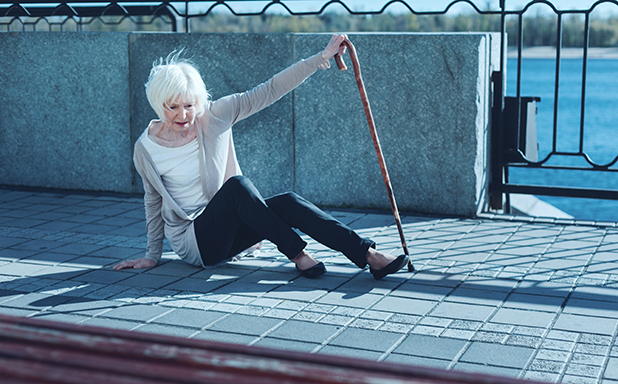New research highlights how the fear of falling can be assessed and clinically managed
The fear of falling is common in older adults and can result in a variety of negative outcomes. Reduced physical and mental well-being, social isolation, and an increased risk of falls are just some of them.
New research from Brunel University London, Imperial College London, and the University of Exeter has explored the link between a person’s perceived control over falling and their risk of falls.
Previous research has shown that high concerns about falling can cause people to adopt maladaptive behaviour (behaviour that is inappropriate for the environment or situation they are in), which increases their risk of falling.

Image: Shutterstock
Dr Toby Ellmers, from the Department of Brain Science at Imperial College London, who led the study, said: “Fear is typically viewed as negative, but for some people and in some situations, fear is adaptive and can lead to useful protective changes that help them avoid falling. However, adaptive behaviour can also lead to negative outcomes.
“The Perceived Control Model of Falling, has been discussed in previous research, as a way of evaluating a person’s risk of falling, through questioning. However, perceived control is not yet routinely assessed in clinical practice, or taken into account to guide clinical decision making.”
For this study, the team of researchers updated the Perceived Control Model of Falling to investigate when fear may be adaptive, and when it may lead to unhelpful outcomes that jeopardise safety or participation (such as avoiding activity or reduced stability).
Dr Elmar Kal, Lecturer in Physiotherapy at Brunel University London, said: “The updated model describes specific mechanisms through which fear of falling can increase fall risk, such as overwhelm and not feeling confident to adapt behaviour.
“Perception of control is a key factor. If you are fearful but feel like you are in the driver’s seat, you can potentially use fear to make helpful, protective changes to your balance control or behaviour.
“However, if you feel there is not much you can do, fear may overwhelm you, distract you from the task at hand, and lead to negative outcomes.”
The new study, published in the journal Age and Ageing, involved 209 UK adults aged between 60 and 90, free from any diagnosed neurological disorders or dementia.
Each participant completed a short questionnaire that measured their perceived control over their fear of falling. This was based on how they had felt in recent weeks.
For each question, participants circled a number between 1 and 5 to indicate whether they strongly agreed or strongly disagreed with each statement. A total score of 13 or below showed a low perceived control of falling, and just over 20% of participants were in this category.
Scores were significantly lower for people who had fallen repeatedly in the last year or who reported that they avoided activities due to a fear of falling.
As a result of the study, the team has made clinical recommendations about how the fear of falling can be clinically assessed and managed.

Image: Shutterstock
"This new framework allows clinicians to identify individuals for whom fear of falling is likely to increase fall risk and to then target specific maladaptive processes, in particular, low perceived control. This advancement may help develop new strategies to clinically manage the fear of falling,” said Dr Kal.
The paper highlights a number of steps that clinicians can follow if a patient’s perceived control over falling is low.
“Clinicians could follow up with more specific questions to identify specific situations or contexts in which low perceived control is most likely to manifest and the causes for this," said Dr Ellmers.
“Increasing perceptions of control will help prevent fear of falling from triggering a panic response and associated maladaptive outcomes."
Dr Kal added: “The model generates a number of key hypotheses that should be directly tested in future experimental work, such as manipulating a person’s perceived control of falling when their balance is threatened to reduce fear. We also need to do further studies to assess if low perceived control leads to worse outcomes over a longer period of time.”
Reported by:
Nadine Palmer,
Media Relations
+44 (0)1895 267090
nadine.palmer@brunel.ac.uk